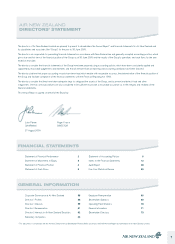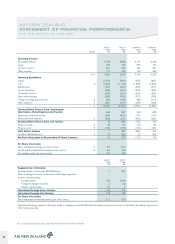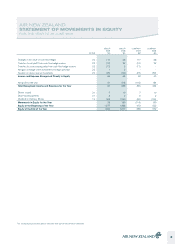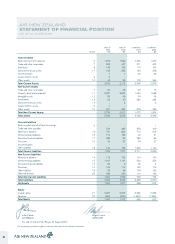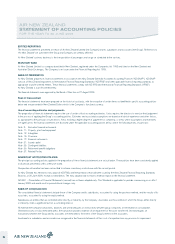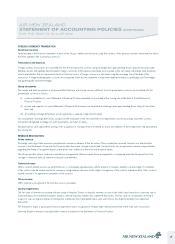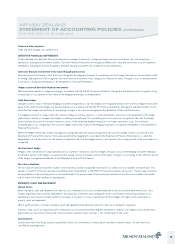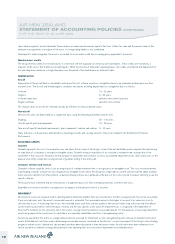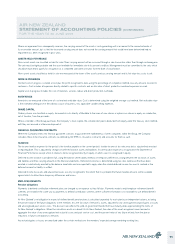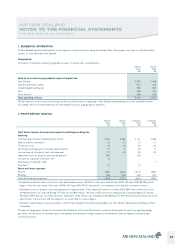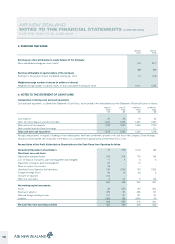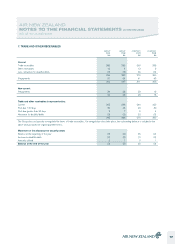Air New Zealand 2009 Annual Report Download - page 9
Download and view the complete annual report
Please find page 9 of the 2009 Air New Zealand annual report below. You can navigate through the pages in the report by either clicking on the pages listed below, or by using the keyword search tool below to find specific information within the annual report.
FOREIGN CURRENCY TRANSLATION
Functional currency
Items included in the financial statements of each of the Group’s entities are measured using the currency of the primary economic environment in which
the entity operates (the “functional currency”).
Transactions and balances
Foreign currency transactions are converted into the relevant functional currency using exchange rates approximating those ruling at transaction date.
Monetary assets and liabilities denominated in foreign currencies at the balance sheet date are translated at the rate ruling at that date. Non-monetary
assets and liabilities that are measured in terms of historical cost in a foreign currency are translated using the exchange rate at the date of the
transaction. Foreign exchange gains or losses are recognised in the income statement, except when deferred in equity as qualifying cash flow hedges
and qualifying net investment hedges.
Group companies
The results and financial position of all group entities that have a functional currency different from the presentation currency are translated into the
presentation currency as follows:
(i) assets and liabilities for each Statement of Financial Position presented are translated at the closing rate at the date of that Statement of
Financial Position;
(ii) income and expenses for each Statement of Financial Performance are translated at exchange rates approximating those ruling at transaction
date; and
(iii) all resulting exchange differences are recognised as a separate component of equity.
On consolidation, exchange differences arising from the translation of the net investment in foreign entities, and of borrowings and other currency
instruments designated as hedges of such investments, are taken to equity.
Goodwill and fair value adjustments arising on the acquisition of a foreign entity are treated as assets and liabilities of the foreign entity and translated at
the closing rate.
REVENUE RECOGNITION
Airline revenue
Passenger and cargo sales revenue is recognised in revenue in advance at the fair value of the consideration received. Amounts are transferred to
revenue in the Statement of Financial Performance when the actual carriage is performed. Unused tickets are recognised as revenue using estimates
regarding the timing of recognition based on the terms and conditions of the ticket and historical trends.
The Group operates various codeshare and alliance arrangements. Revenue under these arrangements is recognised when the Group performs the
carriage or otherwise fulfils all relevant contractual commitments.
Contract revenue
Where contract related services are performed over a contractually agreed period, and the amount of revenue, related costs and stage of completion
of the contract can be reliably measured, revenue is recognised by reference to the stage of completion of the contract at balance date. Other contract
related revenue is recognised on completion of the contract.
Other revenue
Other revenue is recognised at the time the service is provided.
Loyalty programmes
The fair value of revenues associated with the award of Airpoints Dollars to Airpoints members as part of the initial sales transaction is deferred, net of
estimated expiry (non-redeemed Airpoints Dollars), until the Airpoints member has redeemed their points. The fair value of consideration received in
respect of sales of Airpoints Dollars to third parties is deferred, net of estimated expiry, until such time as the Airpoints member has redeemed
their points.
The estimate of expiry is based upon historical experience and is recognised in net passenger revenue at the time of the initial sales transaction.
Deferred Airpoints revenue is recorded within revenue in advance in the Statement of Financial Position.
AIR NEW ZEALAND
STATEMENT OF ACCOUNTING POLICIES (CONTINUED)
FOR THE YEAR TO 30 JUNE 2009
7



